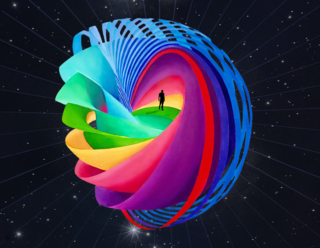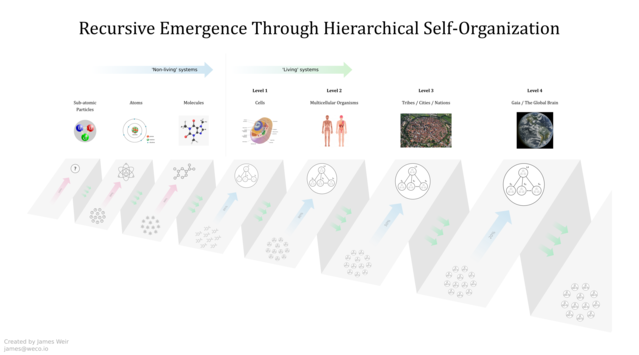Environment
The Psychological Benefits of Finding Your Cosmic Purpose
Existence can be framed as a game with cosmic significance, giving life meaning.
Posted December 1, 2022 Reviewed by Abigail Fagan

Teleology (pronounced tee-lee-ology or teh-lee-ology) is a philosophical term that refers to purpose in the natural world. The teleological stance asks you to look at the big picture and to think deeply about how you fit into that picture. Taking the teleological stance means adopting the perspective that nature has an inherent purpose, and by understanding that purpose, we can derive our own sense of purpose and find meaning in our existence.
When you take the teleological stance, you are choosing to view reality through a certain lens, primarily because it is useful to do so. But its practicality may just be a bonus. New science is revealing that a teleological lens could benefit us precisely because it provides an accurate representation of the nature of reality. An understanding of the scientific and philosophical framework the teleological stance emerges from will expand your awareness, increase your compassion, and cast a psychedelic glaze over reality. For this reason, we will start there.
The Cosmic Basis for the Teleological Stance
The universe no longer appears to just be some big random machine evolving arbitrarily, but instead a creative system that is recursively generating novelty, pattern, and new modes of experience. In other words, reality is an emergence generator. So far, it has produced matter, life, mind, and culture through a process of hierarchical self-organization, whereby nature’s fundamental components come together to form greater wholes, which then become the building blocks for the next level of complexity on the teleological ladder of progress. Subatomic particles came together to form atoms, which came together to form molecules, which then formed cells, which formed complex organisms, which formed societies, and human civilization now seems to be forming what has been described as a “global brain” that spans the planet, thanks to the internet (we are analogous to neurons in the global brain). What is perhaps most astonishing about this process is that it appears to be just getting started.

Although this paradigm is completely naturalistic, many will find its philosophical implications to have a spiritual quality because the direction of evolution creates the appearance that the universe has some grand purpose. The entire cosmos seems to be inevitably evolving towards a future goal state (known as an “Omega Point”), in much the same way a seed develops into a tree, or an embryo into a mature organism. While there may not actually be an ultimate goal or knowable end point, it seems clear that there is an undeniable arrow or direction to the evolutionary process.
This view implies that nature is waking up through the emergence and spread of life and consciousness—phenomena that take on cosmic significance in this new story of the universe’s development. By “cosmic significance,” I mean that life is a mechanism for the growth of complexity that will presumably shape the evolutionary trajectory of the cosmos and determine its large-scale development. And if biologically-based intelligence becomes the primary driver of cosmic evolution once it emerges, then life has objective significance and a mysterious purpose that transcends the individual.
So, if life and nature have a purpose, what is it? Well, if you zoom out and look at the evolutionary process, that becomes self-evident. The purpose of life is to continue to persist. To experience the world. To evolve. To acquire knowledge. To progress. The teleological stance is simply the position one takes once they realize that intelligent life is significant to the universe, and that this significance gives humanity a cosmic purpose. That cosmic purpose extends to you, since you as a conscious entity are a vessel that allows the universe to wake up. The great educator and cosmologist Carl Sagan famously said:
We are a way for the cosmos to know itself.
For the individual, the teleological stance means finding your own purpose, one that in some small way contributes to stabilizing or improving society. This line of reasoning, as mystical as it may sound on the surface, emerges from an understanding of the relationship between life and the second law of thermodynamics.
The Teleological Stance Turns Life Into a Game
The teleological stance naturally emerges from the story of cosmic evolution, and that story is not unlike a mythology. Nature wakes up through a dynamic tension that can be understood as a battle between life and chaos, order and disorder, or knowledge and ignorance. This idea is not unlike the themes expressed in the dialectic of Hegel, the Yin and Yang of Taoism, the Pratītyasamutpāda (interdependent co-arising) of Buddhism, and the fight between good and evil in Christian theology—so the spiritually-inclined readers might find those metaphors to be useful.
The teleological stance takes this framing and turns your life into a game, a game that we may call the “Game of Life.” Gamifying your life can not only be invigorating and empowering, it can also illuminate aspects of reality previously hidden from perception. That is because the Game of Life is not just a game—it is a unifying theory of reality that explains life’s relationship to nature. This unifying theory unites the sciences with a story that explains the continual creation of knowledge in the universe.
To understand why life can be framed as a game, we should first think about what it means to be a game. Stripping them down to their bare essentials, games consist of players that have challenges and goals. This means that games are intrinsically teleological, or goal-oriented.
The teleological stance recognizes that if you are alive, you will inevitably encounter problems. A problem represents a challenge, and a challenge creates a goal. The goal is simply to find a solution to the problem. A goal gives an agent a purpose, and a purpose gives life meaning.
The Game of Life emerges from what many consider to be the most important law in all of physics, the almighty second law of thermodynamics. The second law can be summarized simply as “Things fall apart.” In other words, systems naturally tend toward decay and disorder. The technical term for disorder is “entropy,” and because the second law says entropy tends to increase, nature is constantly pulling us towards death. It is the existential challenge set by the second law that gives life an intrinsic survival goal, thus turning it into a game.
Framing life in thermodynamic terms was first popularized by the great quantum physicist Erwin Schrödinger in his 1944 book What is Life? In it, Schrödinger explained that life can avoid the tendency toward decay and keep its internal entropy low by feeding on “negative entropy” in the environment. Negative entropy is just another name for free energy—energy in the environment that can be used to do physical work. Free energy allows an ordered system to stay ordered so that it may continue playing the Game of Life.
As animals, we consume free energy by eating food, which gets turned into mechanical work through the process of metabolism. Similarly, plants absorb free energy from sunlight and convert it into work through the process of photosynthesis. If an organism does not continually absorb energy, it will die and it will undergo entropic decay until the ordered system ceases to exist. When an energy-starved organism succumbs to the effects of the second law, the Game of Life has come to end for that player.
We can already see that the natural tendency toward disorder creates an intrinsic goal for all living systems: to stay ordered, to persist, to survive. Therefore, the idea that life has an inherent purpose is not a mystical one—it is a fact of nature. Cognitive psychologist Steven Pinker writes:
“The second law defines the ultimate purpose of life, mind, and human striving: to deploy energy and information to fight back the tide of entropy and carve out refuges of beneficial order. An underappreciation of the inherent tendency toward disorder, and a failure to appreciate the precious niches of order we carve out, are a major source of human folly.”
To continue persisting in a world that abides by the second law—to continue playing the Game of Life—we must be able to capture free energy, and we must be able to do so while avoiding threats. However, navigating one’s environment in a chaotic and constantly changing world is no trivial task. It requires that the living system acquire information about the environment, because that information reduces the organism’s uncertainty or ignorance about the variables of the world it is embedded in. We may call the information that reduces an organism’s uncertainty knowledge. As life evolves through hierarchical self-organization, knowledge gets encoded in the memory of the biosphere, which includes genetic, neural, cultural, and digital memory.
It can also be said that an organism must acquire a map or model of its environment. This model is the result of knowledge accumulation, and in an abstract sense the agent’s model is comprised of “beliefs” about the world, or what it expects to encounter. This model is a statistical model, and specifically a predictive model, which allows the organism to anticipate events in a world filled with uncertainty. In humans and other animals, this predictive model is encoded in our brain. Our mental models allow us to achieve our goals and make sense of a complicated and confusing reality. The teleological stance is an example of a mental model that represents a small slice of our more comprehensive world model. The accuracy of this model can be optimized with conscious effort and the cognitive tools that the teleological stance can provide (to be explained in a future article).
We have now presented the theoretical basis for the teleological stance. The tendency toward decay gives life an intrinsic purpose or goal, and that goal requires that the agent acquire knowledge about the world. But we have only scratched the surface of the logical system. This topic is described in more detail at the Road to Omega Substack, so please subscribe if you enjoyed this article. By utilizing many tools according to the philosophy of the teleological stance, we can learn to live life optimally and in harmony with the aspirations of nature.




